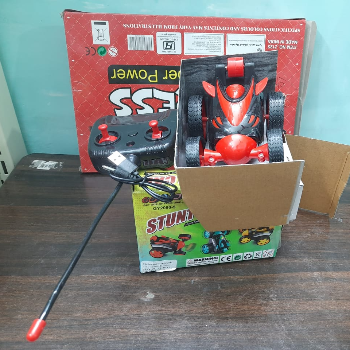In the bustling city of Mumbai, where skyscrapers touch the sky and the roads are always alive with the hum of activity, there lived a young boy named Ankit. Like many children in urban India, Ankit’s days were filled with school, homework, and the humdrums of city life. Yet, amidst the routine, Ankit found himself yearning for something more — a spark to ignite his imagination and a companion for his solitary moments.
The emotional void Ankit felt was not uncommon among children in cities, where outdoor play is often limited by space and safety concerns. His parents, Meera and Rajesh, were aware of this and constantly sought ways to enrich their son’s childhood with meaningful experiences.
One day, while browsing through an online store, Meera stumbled upon a remote control car that promised not just speed and agility, but also hours of imaginative play. It struck her that this might be the key to unlocking the joy and adventure Ankit seemed to be missing.
The remote control car arrived in a sleek package, its vibrant colors and futuristic design instantly capturing Ankit’s attention. As he unwrapped it, his eyes lit up with a sparkle that had been missing for some time. The car wasn’t just a toy; it was a portal to a world where his creativity could run wild.
For Ankit, the remote control car became more than just an object of entertainment. It was a tool that bridged the gap between the confines of his urban apartment and the endless fields of exploration his mind craved. Each play session was a new adventure, where he could be a race car driver, a superhero, or a daring explorer navigating treacherous terrains.
Meera and Rajesh noticed a visible change in Ankit. He was happier, more engaged, and his stories at the dinner table were filled with excitement and creativity. The remote control car had not only provided him with a source of joy but had also enhanced his cognitive skills, improving his hand-eye coordination and problem-solving abilities.
In India, where family and community are central to life, the remote control car also became a bonding tool. Ankit’s playtime soon involved his cousins, neighbors, and even his parents. Weekend gatherings saw friendly competitions and shared laughter as everyone took turns maneuvering the car through obstacle courses made of pillows and books.
The transformation in Ankit’s life is a testament to the power of play and the role of toys in emotional and cognitive development. According to a study by the National Institute of Mental Health and Neurosciences in Bangalore, play is crucial for children’s emotional well-being, helping them develop resilience and social skills. The remote control car provided Ankit not just with entertainment but also with these vital developmental benefits.
For parents like Meera and Rajesh, the remote control car was a simple yet effective solution to the challenge of nurturing their child’s imagination and emotional health in a fast-paced city environment. It offered a practical way to enrich Ankit’s life, proving that sometimes, the right toy can be the key to unlocking a world of possibilities.
In conclusion, the remote control car did more than rev up its tiny engine; it revved up Ankit’s spirit. It turned mundane afternoons into thrilling escapades and transformed a quiet boy into an enthusiastic storyteller. For parents seeking to bring joy and development into their child’s life, a remote control car could be the perfect companion on this journey.
So, if you find yourself wondering how to bring a spark into your child’s life, consider the humble yet powerful remote control car. It might just be the key to unlocking endless adventures and cherished memories, just as it did for Ankit in the heart of Mumbai.
Visit Vyaparify Site:
https://id.vyaparify.com/radhekkrishna 
